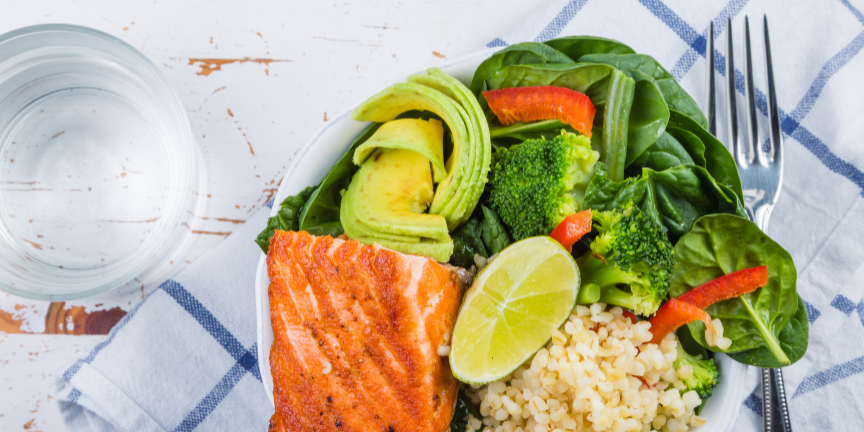4 rules to help you easily compose a balanced meal

When looking for information on healthy eating or ways to lose weight, you will surely come across the phrase “balanced meal” or “balanced diet” at least once. What do these terms really mean? Find out in our article and learn 4 principles that will help you create a balanced meal and simplify composing a healthy diet.
When we hear ‘balanced meal’ we think we know what it means. But do we really? Let’s take a closer look at what and in what quantities should land on your plate to be able to call your meal properly balanced.
What does a balanced meal mean?
A balanced meal is one that provides the necessary nutrients in sufficient quantities to cover your macronutrient and vitamin and mineral requirements. What does this mean in practice? It means that the meal should be primarily a source of protein, unsaturated fats and complex carbohydrates and contain a portion of fruit and/or vegetables. These will be a source of soluble fibre and vitamins and minerals. The proportion of macronutrients in the diet of an average healthy adult should be an appropriate percentage of daily energy requirements:
- protein – 15-20%
- fat – 25 – 30%
- carbohydrates – 50-60%
Depending on the dietary plan used or the coexisting medical condition, this ratio may vary. To find out how to calculate your energy requirements, which is the starting point for calculating the proportion of macronutrients, read the article How to calculate your caloric needs correctly (including: why the different calculators differ).
A balanced meal and dietary protein
The best sources of dietary protein are:
- lean meat (e.g. skinless chicken, skinless turkey, pork tenderloin),
- fish,
- eggs,
- lean dairy products (e.g. skim cottage cheese, skyr, natural yoghurt, kefir).
When choosing meat, make sure it is mainly poultry meat and not red meat. The latter contains more saturated fats and should not be eaten more than once a week. Fish should appear on the menu at least once a week. Seven eggs per week is considered a safe amount (this number should not be exceeded due to the cholesterol contained in the yolk). There is no quantitative limit to the consumption of dairy products, but it should be borne in mind that dairy products have an acidifying effect on the body and should also be consumed in moderation.
Balanced meals and dietary fat
The main sources of fat in the diet include:
- vegetable oils (e.g. rapeseed, linseed),
- olive oil,
- fatty fish (e.g. salmon, mackerel, herring),
- nuts and seeds (e.g. walnuts, hazelnuts, pumpkin seeds, sunflower seeds, etc.),
- avocados.
These fats are a source of unsaturated fatty acids and fat-soluble vitamins, the presence of which is essential for the proper functioning of our body and also important in the prevention of cardiovascular diseases. Products such as butter, lard, and fatty red meat (i.e. pork and beef), among others, are sources of saturated fatty acids, the presence of which in the diet should be low. Hence, their frequent use in the diet is not recommended.
A balanced meal and carbohydrates in the diet
Dietary sources of carbohydrates include:
- whole grain bread,
- whole-grain pasta,
- whole-grain rice,
- groats (e.g. millet, buckwheat, barley),
- vegetables (e.g. potatoes, maize, lentils, chickpeas, peas),
- oat flakes,
- bran,
- fruit.
When choosing products as a source of carbohydrates, special care should be taken to ensure that they are whole grains. This is important insofar as they are sources of complex carbohydrates, so that they:
- do not raise blood sugar levels as much,
- are rich in vitamins (mainly B vitamins) and minerals,
- are a source of insoluble fibre, which has a beneficial effect on health and intestinal peristalsis.
Particular attention should be paid to the choice of bread, as ‘dark bread’ is not always whole grain. It can often be coloured with caramel, and you can find out if this is the case on the label.
Vitamins and minerals in a balanced diet
Let’s be honest – hardly anyone counts vitamins and minerals on a daily basis. Nowadays, with our fast-paced lifestyles, it is difficult to find the time for this. So how can we ensure an adequate supply? It is advisable to eat at least 4-5 portions of fruit and vegetables per day and to include them in every meal. Of course, this may not be enough for some reason, but it will certainly increase the likelihood of having the right amount of them in the diet. One portion of fruit or vegetables is simply considered to be 100g.
Does every meal have to be perfectly balanced?
Of course, not every meal has to be so balanced, although it is advisable to do so. When planning your meals, it is worth taking into account the recommended macronutrient ratios, but it is important to remember that every body is different. Maybe you, for some reason, prefer to eat protein and fat breakfasts and eat more carbohydrates for dinner in the evening? If there are no health contraindications to this, it’s ok, just look at your diet in a daily or even weekly context and balance it accordingly.
How do I balance my meals easily and quickly?
To make the process of planning or controlling your menu easier, it is worth using a calorie calculator such as the Fitatu app. With such a tool, you can easily count calories, as well as macronutrients and vitamins and minerals. Simply add the product to your menu and the app will calculate the values it contains and show you the values on a daily and weekly basis. This will make it much easier for you to control what you eat and verify the balance of your diet.
Fitatu App
Download the application from the Play Store or Apple Store and start counting your macros with us!
Do you prefer the web version? No problem. A basic web version is prepared for our subscribers. And now you can use the MEAL-C discount code by going to https://www.fitatu.com/app/order-and-payment and get 29% off your monthly Fitatu Premium.
What else can you find in Fitatu Premium?
- over 2000 recipes plus several new ones every month
- additional plans for intermittent fasting
- the ability to create shopping lists
- a choice of six ready-made menus full of meals to choose
- filtering products and recipes
- more synchronization with fit apps
- access to your Meal Plan in the web version
- no ads!
Bibliography:
https://ncez.pzh.gov.pl/choroba-a-dieta/jajka-na-wielkanoc-i-na-co-dzien/





